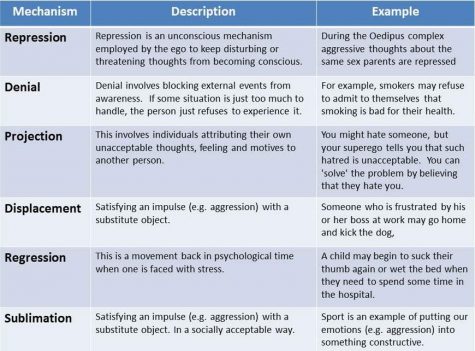Living in an Emotionally Monotone Society
how Tahoma students cope with emotions and what they continue to hide.

Via Creative Commons
January 26, 2018
Imagine a simpler world. A world where negative emotions are logical and all people know how to communicate them. In this world, people would be open with their emotions and wouldn’t need to accommodate to others. In this same world, cancer is cured, the world hunger epidemic is extinct, war is not an option, and college is free. Yet, after this unlikely dream is over, people have to to deal with real problems. At this point, questions such as “Why is life so hard? Why can’t money fall from the sky?” or “When will my hard work pay off?” arise. The way people find peace in a flawed world is a challenge and unites the masses in a bittersweet way. Although people feel united through perseverance, the journey of life is nothing less than a battle. As the years progress, emotional intelligence suffers based on the inability to understand negative emotion, how to express negative emotion, and cultural norms that limit expression.
Tahoma students and people in any public situation enclose certain information, thus, aiding people to forget that they only know what people present on the surface. Jasen Fleming, a Junior at Tahoma expands on emotional complexities by adding, “Some people are judged in the way they express their feelings. Some people are immature…I don’t know how to explain it.” Fleming then elaborates on how some people can’t take emotions seriously or think all things are said in a joking matter.
When negative emotions arise, generally, a person’s first instinct is to flee. Positive emotions are optimal and showing negative emotions symbolize weakness to many. Although emotional intelligence is vital to human relationships and drives personal growth, there are only so many people in the world wishing their lives were harder just for the sake of bettering themselves in the future. Unfortunate events and negative emotions, such as sadness or anger, will never occur at convenient times. These circumstances push people to forget that emotions are what make people magnificent and diverse.
Sophomore Sydney Adams weighs in with her opinion by saying, “You’re going to be put down for being happy or sad. They want you to be happy but when you are they think you’re inconsiderate” When Tahoma students are surrounded by constant stressors and pressure to be happy then how will emotions ever be normalized as accepted behavior?
Sophomore, Royce Kostohris, justifies her reason to enclose negative emotions by saying, “I don’t want people to think I’m a negative person.” This proves how people expect perfection when perfection is impossible.
Without emotion or passion, the world loses meaning. People wouldn’t have remorse or sympathy. They wouldn’t feel the need to advocate for their beliefs or push their limits. Love, hate, happiness, and jealousy would be dismissed and humanity itself would have no debate about right and wrong. Emotion and passion are what makes the world such a beautifully horrible place. Whether it’s a God, fate, luck or even karma, people are forced to endure and overcome intensely negative emotions. So with this, society’s normalities are questioned.
In a society that puts constant pressure on emotional control and self-sufficiency, emotional intelligence consistently fails to be recognized. In the midst of expressing negative emotion, there is an underlying drive for how these basic emotions are expressed. Some might accuse others of being too sensitive while others choose to suppress their emotions to avoid radiating negativity. Throughout society all people will experience negative emotions but what affects how people cope with unwanted emotions?
Before analyzing how people express emotions, basic emotions must be identified. According to a VeryWell article, written by book author and psychologist Kendra Cherry, the six basic emotions are happiness, surprise, sadness, anger, disgust, and fear. In a world, with lots of obligations and stressors negative emotions easily get out of hand.
An element of social acceptance is cultural surroundings. This influences if emotions should be expressed based on things such as gender, age, and personal normative habits. In modern Western society, people feel pressured to offer comfort to others in pain but those in pain are pressured to be emotionally independent and not force their problems on others. This ongoing plight is fueled by the lack of emotional understanding and impatience to be sympathetic and volunteer their time. Gender norms reinforce the notion that boys are less sensitive compared to girls. Overall, the older people get the more rational they should be with their emotions.
Odalys Terrazas Amador, a junior at Tahoma, opens up about her feelings when explaining, “I feel weak [when I express emotions]. I don’t like the pity. In a non-personal environment showing a personal part of you, it might seem inappropriate.” In that sense, all students of Tahoma should take the opportunity to self-reflect and evaluate the emotions of themselves and others.
When negative emotions hit, people have the option of dealing with their emotions head on and finding a solution or using a plethora of defense mechanisms. The six main mechanisms are repressions, denial, projection, displacement, repression, and sublimation.

Sublimation can be seen in musicians, authors, and artists throughout history. People like Amy Winehouse, Vincent Van Gogh, and F. Scott Fitzgerald all heavily used sublimation through their creations to cope with struggles in their lives. These revolutionary artists felt pain and found a socially acceptable way to both express it themselves and help others with the same pains cope with them.
Some Tahoma students handle their emotions with consideration of others and chose to be in tune with them rather than refute them. Tahoma junior, Anika Wilson, is quick to say “People feel uncomfortable when you share too much…I think there are appropriate people to share things with and times as well.” The aspect of emotional acceptance and appropriateness in Tahoma accentuates how to find positive ways to handle negative emotions. Wilson says, “I like to write. I definitely like to get everything out on paper and I think that’s really healthy to have it all out there.” Having a way to individually and interactively express emotion is something that Tahoma students struggle with constantly but some have learned to improve.
More specifically, the denial defense mechanism is seen with the death of a loved one which takes time to accept. Denial delays the coping process and can correlate with procrastination. If people don’t accept their problems then their life is simpler and so the problem is prolonged and so is the pain of coping. The satisfaction of procrastinating emotions to avoid hurt then causes short-term rewards but long-term consequences. If emotions are not dealt with in a healthy way they are buried in the subconscious. Information found in one’s subconscious mind cannot be recited or identified but they do affect emotion and action.

As more information about emotions is discovered, other theories can be explored as contributors to emotional state such as the left-brain and right-brain theory. This theory can be described as a personality difference according to which side of the brain is “stronger.” People with a stronger left brain tend to be more logical while right brain strength is seen through creativity and emotional intelligence.
“No matter how lateralized the brain can get the two sides still work together,” Yale graduate and science writer explains in Discover magazine article.
In other words, no matter how split the brain may seem, the two sides will always cooperate to meet common goals. As a very widely known theory that seems like conventional knowledge, it is important for people to understand that emotional expression is not a fixed problem. People in turn can’t treat this like a fixed problem. With more emotional acceptance and awareness, people of the world would find peace within themselves and others.
In a realistic future, negative emotions can be coped with and Tahoma students will be empowered to express them in positive ways. In this world, students are not afraid to speak up about their struggles, people unite and aid each other in difficult times, and college is free (maybe).










